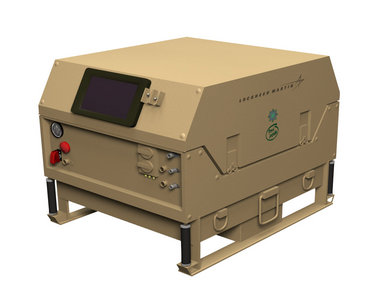Lockheed Martin developing solar/fuel cell generator for Navy
 One of the most dangerous situations for the armed forces is simply delivering fuel. It costs lives and adds a significant cost to the fuel itself. So one of the things the armed forces in the U.S. are trying to do is reduce their use of fuel. Lockheed Martin won a contract from the Office of Naval Research to deliver a hybrid generator that produces electricity from a fuel cell as well as a solar array. The fuel cell would be more efficient than a traditional generator, using less fuel to produce the same amount of power and the solar array would further reduce the use of fuel for such a system.
One of the most dangerous situations for the armed forces is simply delivering fuel. It costs lives and adds a significant cost to the fuel itself. So one of the things the armed forces in the U.S. are trying to do is reduce their use of fuel. Lockheed Martin won a contract from the Office of Naval Research to deliver a hybrid generator that produces electricity from a fuel cell as well as a solar array. The fuel cell would be more efficient than a traditional generator, using less fuel to produce the same amount of power and the solar array would further reduce the use of fuel for such a system.
Under the roughly $3 million contract Lockheed Martin has 32-months develop, demonstrate and deliver a multi-kilowatt Fuel Cell Efficient Power Node that works with the Navy’s JP-8 fuel. The solid-oxide fuel cell (SOFC) genset will be designed to reduce fuel consumption by at least 50 percent and will be evaluated by the U.S. Marines.
“The SOFC genset is designed to be able to work directly on the DoD standard logistic fuels, such as JP-8, JP-5, Jet-A and diesel. The Lockheed Martin / TMI SOFC technology is unique in that, unlike any other fuel cell, it can run directly on those DoD standard logistic fuels without any complicated desulfurization,” said Steven Sinsabaugh, a Lockheed Martin fellow in its Lockheed Martin Mission Systems & Sensors division.
The systems are being designed for more remote operations. “The primary focus for this project is for tactical generator sets like the Marines might use in forward deployments. These are typically generator sets sized in the range of 2 kilowatts to 60 kilowatts,” Sinsabaugh said.
Currently most gensets used by the Department of Defense use internal combustion engines. “[They] are ruggedized versions of the backup power generator sets that civilians can purchase at places like Lowes or Home Depot,” Sinsabaugh said. “Lockheed Martin’s SOFC generator sets are much more fuel efficient. That means that the Marines and Army will be able to reduce the amount of fuel needed to support forward deployed camps. As seen in Iraq and Afghanistan, these fuel convoys have been a major vulnerability to attacks and IEDs, with many lives lost delivering this fuel. Our SOFC gensets will reduce this fuel usage by up to one half, saving money but more importantly saving lives,” he said.



